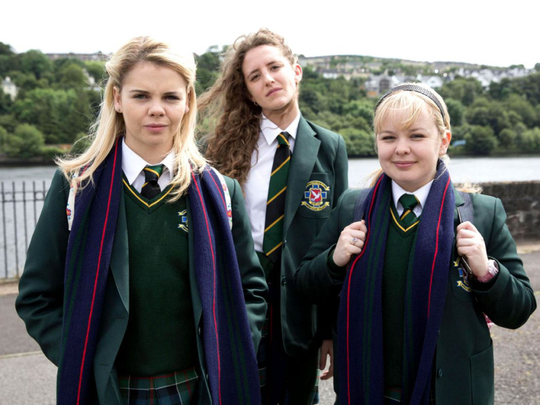
A new television series recently began in Northern Ireland about the lives of four girls growing up in the region during the ‘Troubles’. It’s called Derry Girls and is set in the 1990s in my hometown of Derry and is a funny look at how the ordinary lives of these teenagers were made extraordinary because they were lived against a backdrop of terrorism, soldiers, guns, bomb scares, riots, the British Government and the Irish Republican Army.
I grew up in the same era and as such, watching the half-hour episodes every Thursday night brings back so many memories of growing up in the city, going to my Catholic grammar school and the laughs that my friends and I enjoyed despite the turmoil that was happening around us. The show is written by Lisa McGee, who went to the same school as me and has an impressive record of writing for various other Channel Four television series such as Being Human. But this one piece of work must have been a project close to her heart and it shows. While it is a comedy, there are also many touching moments and also many laugh-out-loud moments, as the four girls — along with their young, male, English sidekick — get up to all sorts of high jinks.
It really is like watching a snippet of my history every week, and it cleverly steers clear of the horror that the times brought for many people, but stays with the simplicity of the four girls’ lives, their families, teachers and their as-yet innocence to the real hate and fear that defined the times.
I myself was one such Derry girl, navigating the choppy waters of the teenage years while the politics of my country was being thrust upon me through the bitter teachings of the adults around me and the unusual events I witnessed.
Unavoidable aspect of life
I lived through bombings and riots and the presence of ominous-looking men wearing balaclavas wandering the streets of my housing estate with Molotov cocktails, while I was trying to discover cocktails of my own with my friends. I suppose it was slightly different for me in that I lived in a Republican/nationalist housing estate, where politicisation of every aspect of life was unavoidable.
I have one particular memory that seems to me to sum up the troubles as seen through the eyes of a child. We lived in a small wood-chipped, pebble-dashed two-bedroom house. We were playing out in the street with other children, skipping with ropes and doing what children do when we heard smashing glass and the police sirens we had come to recognise so well. Down the end of the street were police cars and a few young men throwing bottles at the officers. Our mother yelled for us to get into the house and we did without question, not really understanding what was going on. I don’t remember feeling fear, but my only memory was a frightened dog that had got caught up in the melee and had seen us running towards our front door. It dived straight in under our little legs and hid underneath the sofa. For us, this was the best thing to ever happen and we laughed at how terrified the terrier was. I felt sorry for the mutt and our mother did too, as she let it stay until the madness outside had died down. That for me shows how such violence is received by children and how they translate it. Who knows how the decades of turbulence have affected people like myself and all those other ‘Derry Girls’ across the whole of Northern Ireland.
There haven’t been any episode featuring such violence in the Derry Girls series yet and it will be interesting to see if they broach such darker territory. I doubt it, and in a way, it’s probably better to focus on the positive side of the lives that we led. As far as I’m concerned I had a great childhood growing up in Derry, despite the politics. But perhaps this was because we didn’t know any other way to be, or any other life.
Christina Curran is freelance journalist based in Northern Ireland.









